Psychosocial Interventions and Functional Recovery in Schizophrenia
VerifiedAdded on 2020/05/16
|7
|1670
|191
Presentation
AI Summary
This presentation explores the significance of psychosocial interventions in the treatment of schizophrenia. It begins by introducing schizophrenia as a chronic mental disorder and highlights the limitations of antipsychotic medications, emphasizing the growing importance of psychosocial interventions. The presentation then details five key approaches: cognitive therapy, psycho-education programs, family-based interventions, social skills training, and assertive community treatment (ACT). It emphasizes the patient-centered nature of these interventions and their benefits in improving treatment adherence, quality of life, social functioning, and remission rates. The presentation further discusses the efficacy of these interventions in promoting functional recovery and their cost-effectiveness, supported by research findings. It concludes by underscoring the value of combining medication with psychosocial interventions for better patient outcomes.
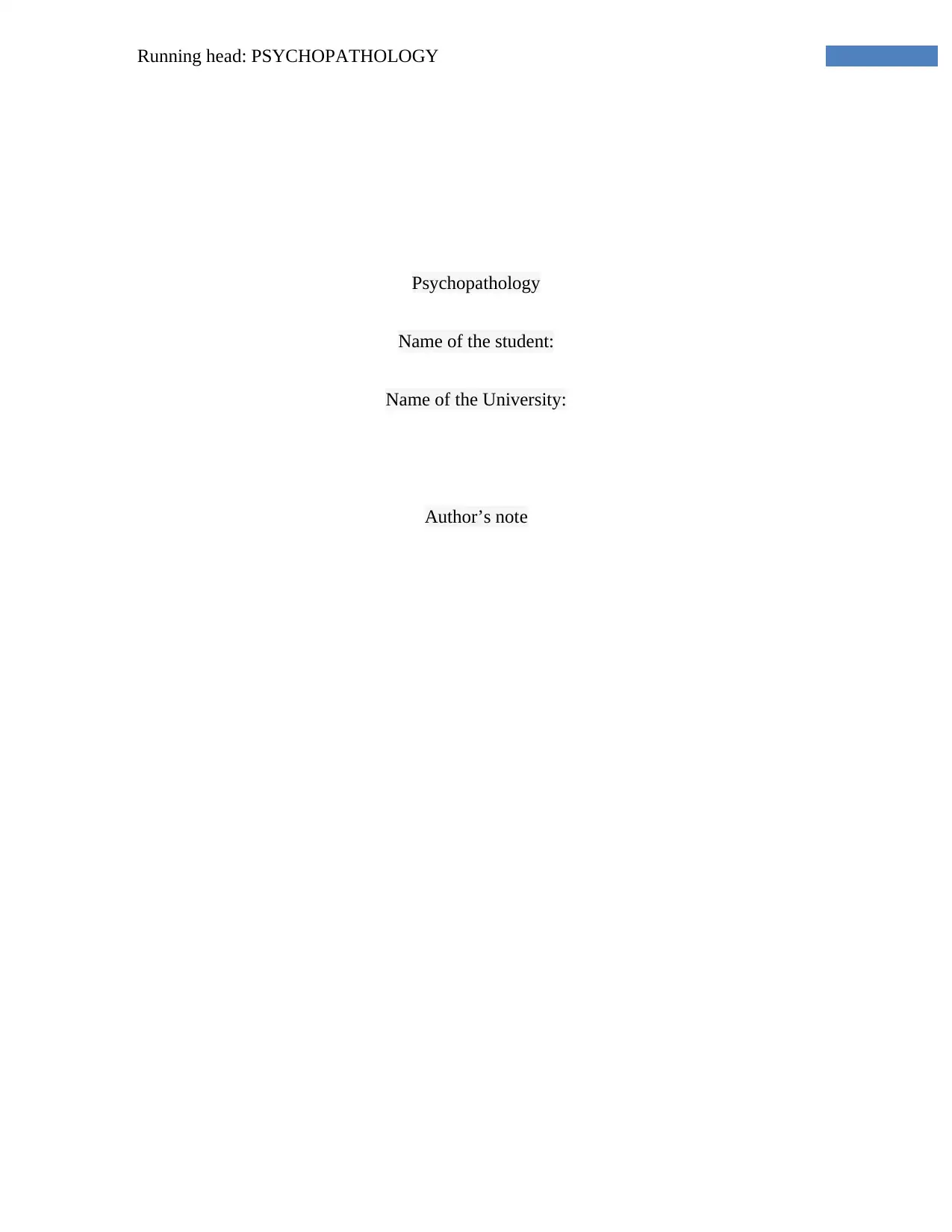
Running head: PSYCHOPATHOLOGY
Psychopathology
Name of the student:
Name of the University:
Author’s note
Psychopathology
Name of the student:
Name of the University:
Author’s note
Paraphrase This Document
Need a fresh take? Get an instant paraphrase of this document with our AI Paraphraser
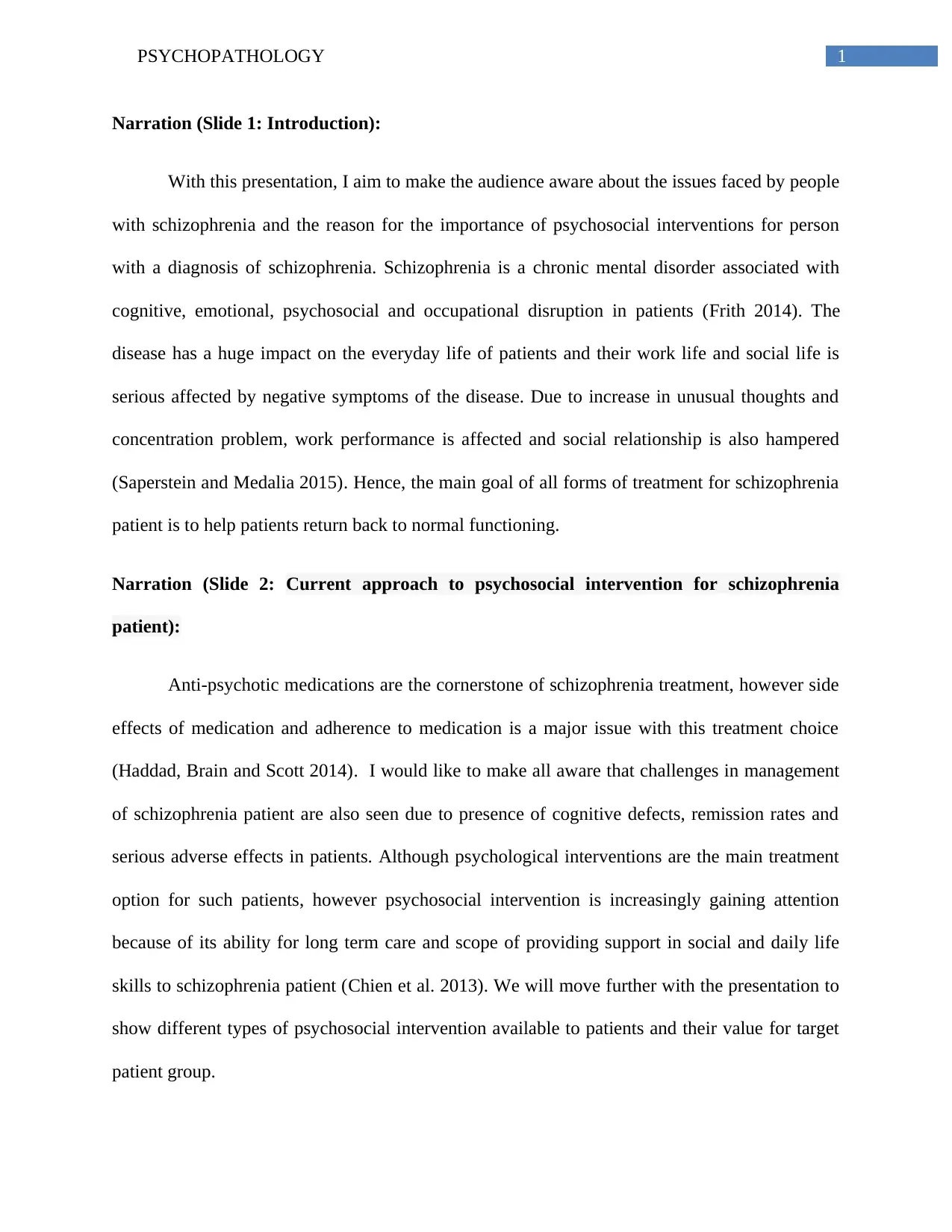
1PSYCHOPATHOLOGY
Narration (Slide 1: Introduction):
With this presentation, I aim to make the audience aware about the issues faced by people
with schizophrenia and the reason for the importance of psychosocial interventions for person
with a diagnosis of schizophrenia. Schizophrenia is a chronic mental disorder associated with
cognitive, emotional, psychosocial and occupational disruption in patients (Frith 2014). The
disease has a huge impact on the everyday life of patients and their work life and social life is
serious affected by negative symptoms of the disease. Due to increase in unusual thoughts and
concentration problem, work performance is affected and social relationship is also hampered
(Saperstein and Medalia 2015). Hence, the main goal of all forms of treatment for schizophrenia
patient is to help patients return back to normal functioning.
Narration (Slide 2: Current approach to psychosocial intervention for schizophrenia
patient):
Anti-psychotic medications are the cornerstone of schizophrenia treatment, however side
effects of medication and adherence to medication is a major issue with this treatment choice
(Haddad, Brain and Scott 2014). I would like to make all aware that challenges in management
of schizophrenia patient are also seen due to presence of cognitive defects, remission rates and
serious adverse effects in patients. Although psychological interventions are the main treatment
option for such patients, however psychosocial intervention is increasingly gaining attention
because of its ability for long term care and scope of providing support in social and daily life
skills to schizophrenia patient (Chien et al. 2013). We will move further with the presentation to
show different types of psychosocial intervention available to patients and their value for target
patient group.
Narration (Slide 1: Introduction):
With this presentation, I aim to make the audience aware about the issues faced by people
with schizophrenia and the reason for the importance of psychosocial interventions for person
with a diagnosis of schizophrenia. Schizophrenia is a chronic mental disorder associated with
cognitive, emotional, psychosocial and occupational disruption in patients (Frith 2014). The
disease has a huge impact on the everyday life of patients and their work life and social life is
serious affected by negative symptoms of the disease. Due to increase in unusual thoughts and
concentration problem, work performance is affected and social relationship is also hampered
(Saperstein and Medalia 2015). Hence, the main goal of all forms of treatment for schizophrenia
patient is to help patients return back to normal functioning.
Narration (Slide 2: Current approach to psychosocial intervention for schizophrenia
patient):
Anti-psychotic medications are the cornerstone of schizophrenia treatment, however side
effects of medication and adherence to medication is a major issue with this treatment choice
(Haddad, Brain and Scott 2014). I would like to make all aware that challenges in management
of schizophrenia patient are also seen due to presence of cognitive defects, remission rates and
serious adverse effects in patients. Although psychological interventions are the main treatment
option for such patients, however psychosocial intervention is increasingly gaining attention
because of its ability for long term care and scope of providing support in social and daily life
skills to schizophrenia patient (Chien et al. 2013). We will move further with the presentation to
show different types of psychosocial intervention available to patients and their value for target
patient group.
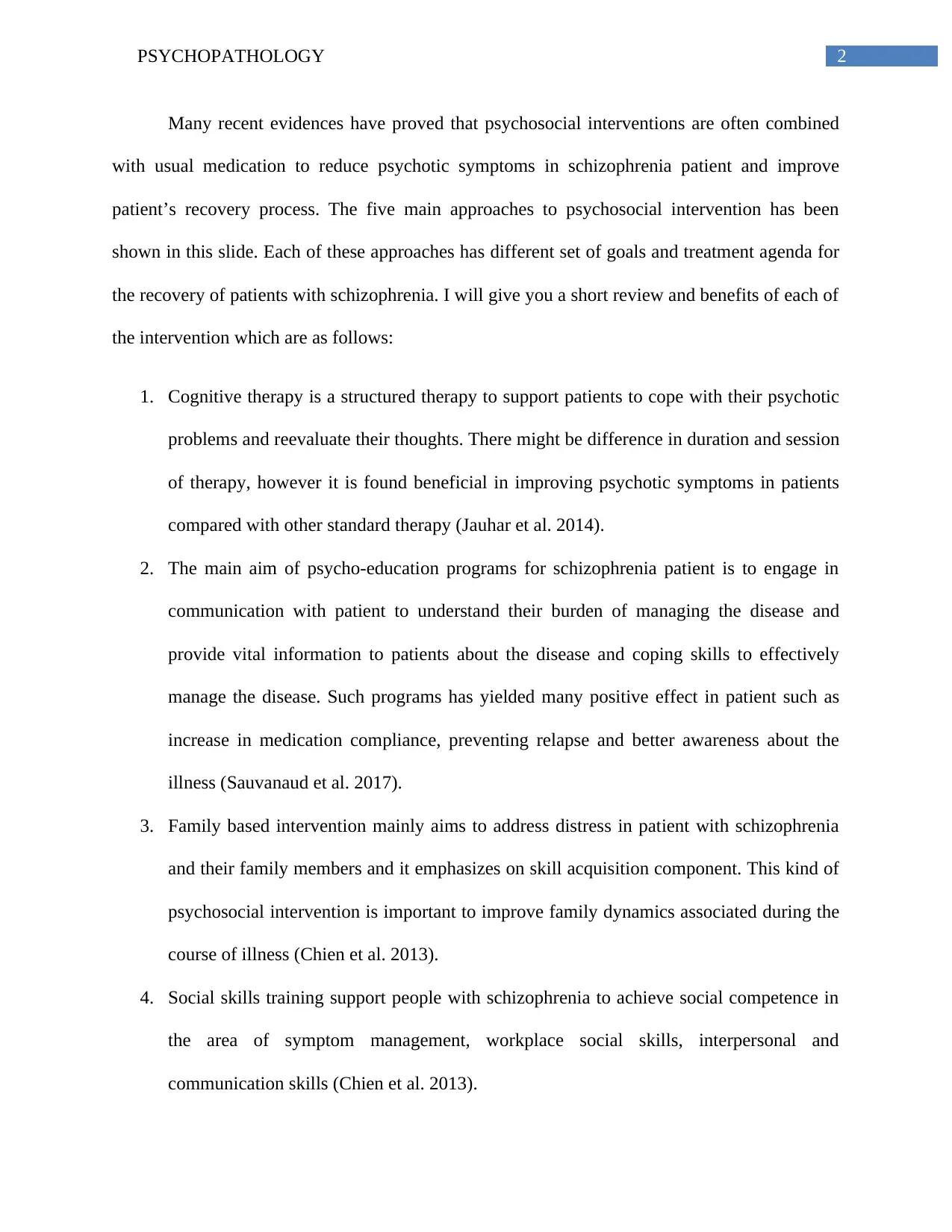
2PSYCHOPATHOLOGY
Many recent evidences have proved that psychosocial interventions are often combined
with usual medication to reduce psychotic symptoms in schizophrenia patient and improve
patient’s recovery process. The five main approaches to psychosocial intervention has been
shown in this slide. Each of these approaches has different set of goals and treatment agenda for
the recovery of patients with schizophrenia. I will give you a short review and benefits of each of
the intervention which are as follows:
1. Cognitive therapy is a structured therapy to support patients to cope with their psychotic
problems and reevaluate their thoughts. There might be difference in duration and session
of therapy, however it is found beneficial in improving psychotic symptoms in patients
compared with other standard therapy (Jauhar et al. 2014).
2. The main aim of psycho-education programs for schizophrenia patient is to engage in
communication with patient to understand their burden of managing the disease and
provide vital information to patients about the disease and coping skills to effectively
manage the disease. Such programs has yielded many positive effect in patient such as
increase in medication compliance, preventing relapse and better awareness about the
illness (Sauvanaud et al. 2017).
3. Family based intervention mainly aims to address distress in patient with schizophrenia
and their family members and it emphasizes on skill acquisition component. This kind of
psychosocial intervention is important to improve family dynamics associated during the
course of illness (Chien et al. 2013).
4. Social skills training support people with schizophrenia to achieve social competence in
the area of symptom management, workplace social skills, interpersonal and
communication skills (Chien et al. 2013).
Many recent evidences have proved that psychosocial interventions are often combined
with usual medication to reduce psychotic symptoms in schizophrenia patient and improve
patient’s recovery process. The five main approaches to psychosocial intervention has been
shown in this slide. Each of these approaches has different set of goals and treatment agenda for
the recovery of patients with schizophrenia. I will give you a short review and benefits of each of
the intervention which are as follows:
1. Cognitive therapy is a structured therapy to support patients to cope with their psychotic
problems and reevaluate their thoughts. There might be difference in duration and session
of therapy, however it is found beneficial in improving psychotic symptoms in patients
compared with other standard therapy (Jauhar et al. 2014).
2. The main aim of psycho-education programs for schizophrenia patient is to engage in
communication with patient to understand their burden of managing the disease and
provide vital information to patients about the disease and coping skills to effectively
manage the disease. Such programs has yielded many positive effect in patient such as
increase in medication compliance, preventing relapse and better awareness about the
illness (Sauvanaud et al. 2017).
3. Family based intervention mainly aims to address distress in patient with schizophrenia
and their family members and it emphasizes on skill acquisition component. This kind of
psychosocial intervention is important to improve family dynamics associated during the
course of illness (Chien et al. 2013).
4. Social skills training support people with schizophrenia to achieve social competence in
the area of symptom management, workplace social skills, interpersonal and
communication skills (Chien et al. 2013).
⊘ This is a preview!⊘
Do you want full access?
Subscribe today to unlock all pages.

Trusted by 1+ million students worldwide
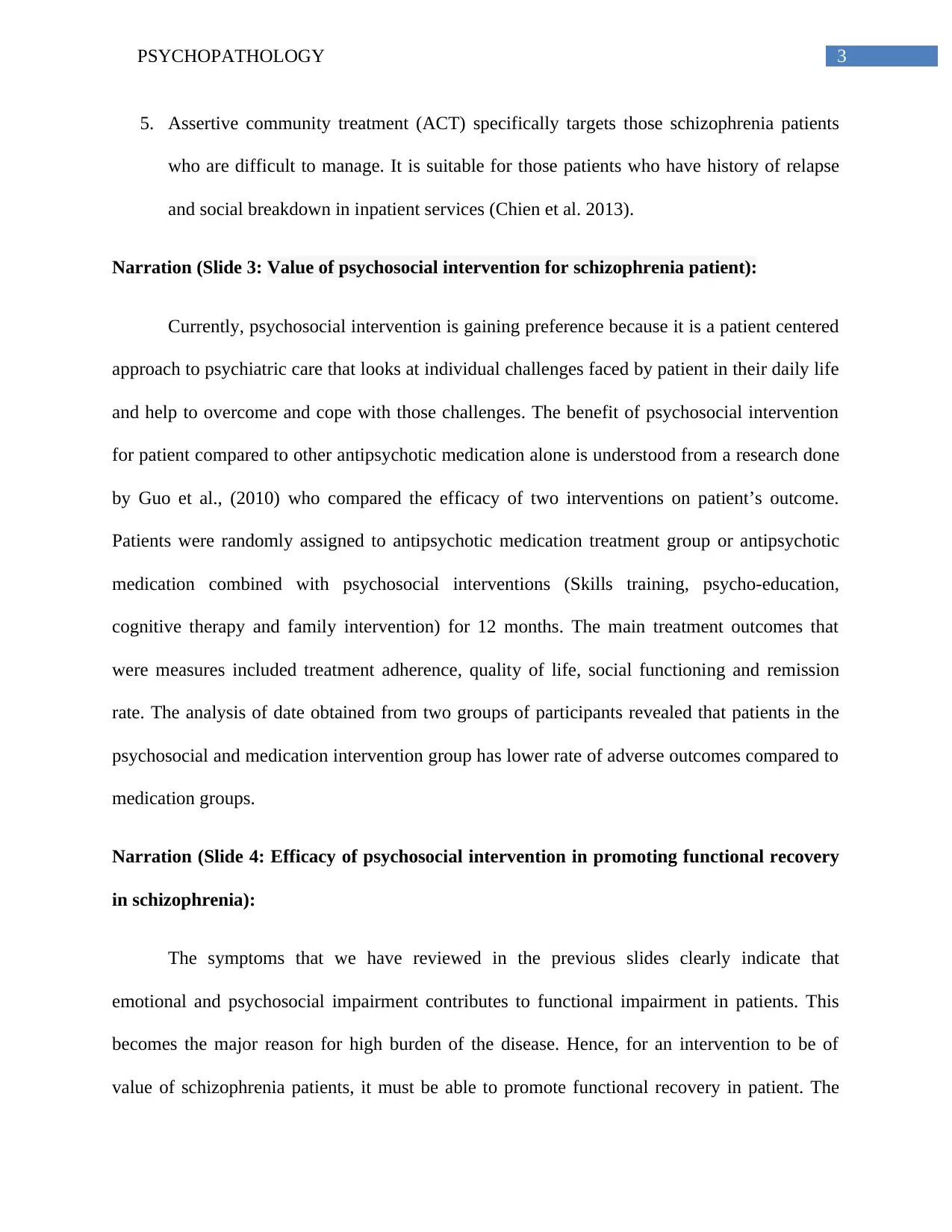
3PSYCHOPATHOLOGY
5. Assertive community treatment (ACT) specifically targets those schizophrenia patients
who are difficult to manage. It is suitable for those patients who have history of relapse
and social breakdown in inpatient services (Chien et al. 2013).
Narration (Slide 3: Value of psychosocial intervention for schizophrenia patient):
Currently, psychosocial intervention is gaining preference because it is a patient centered
approach to psychiatric care that looks at individual challenges faced by patient in their daily life
and help to overcome and cope with those challenges. The benefit of psychosocial intervention
for patient compared to other antipsychotic medication alone is understood from a research done
by Guo et al., (2010) who compared the efficacy of two interventions on patient’s outcome.
Patients were randomly assigned to antipsychotic medication treatment group or antipsychotic
medication combined with psychosocial interventions (Skills training, psycho-education,
cognitive therapy and family intervention) for 12 months. The main treatment outcomes that
were measures included treatment adherence, quality of life, social functioning and remission
rate. The analysis of date obtained from two groups of participants revealed that patients in the
psychosocial and medication intervention group has lower rate of adverse outcomes compared to
medication groups.
Narration (Slide 4: Efficacy of psychosocial intervention in promoting functional recovery
in schizophrenia):
The symptoms that we have reviewed in the previous slides clearly indicate that
emotional and psychosocial impairment contributes to functional impairment in patients. This
becomes the major reason for high burden of the disease. Hence, for an intervention to be of
value of schizophrenia patients, it must be able to promote functional recovery in patient. The
5. Assertive community treatment (ACT) specifically targets those schizophrenia patients
who are difficult to manage. It is suitable for those patients who have history of relapse
and social breakdown in inpatient services (Chien et al. 2013).
Narration (Slide 3: Value of psychosocial intervention for schizophrenia patient):
Currently, psychosocial intervention is gaining preference because it is a patient centered
approach to psychiatric care that looks at individual challenges faced by patient in their daily life
and help to overcome and cope with those challenges. The benefit of psychosocial intervention
for patient compared to other antipsychotic medication alone is understood from a research done
by Guo et al., (2010) who compared the efficacy of two interventions on patient’s outcome.
Patients were randomly assigned to antipsychotic medication treatment group or antipsychotic
medication combined with psychosocial interventions (Skills training, psycho-education,
cognitive therapy and family intervention) for 12 months. The main treatment outcomes that
were measures included treatment adherence, quality of life, social functioning and remission
rate. The analysis of date obtained from two groups of participants revealed that patients in the
psychosocial and medication intervention group has lower rate of adverse outcomes compared to
medication groups.
Narration (Slide 4: Efficacy of psychosocial intervention in promoting functional recovery
in schizophrenia):
The symptoms that we have reviewed in the previous slides clearly indicate that
emotional and psychosocial impairment contributes to functional impairment in patients. This
becomes the major reason for high burden of the disease. Hence, for an intervention to be of
value of schizophrenia patients, it must be able to promote functional recovery in patient. The
Paraphrase This Document
Need a fresh take? Get an instant paraphrase of this document with our AI Paraphraser
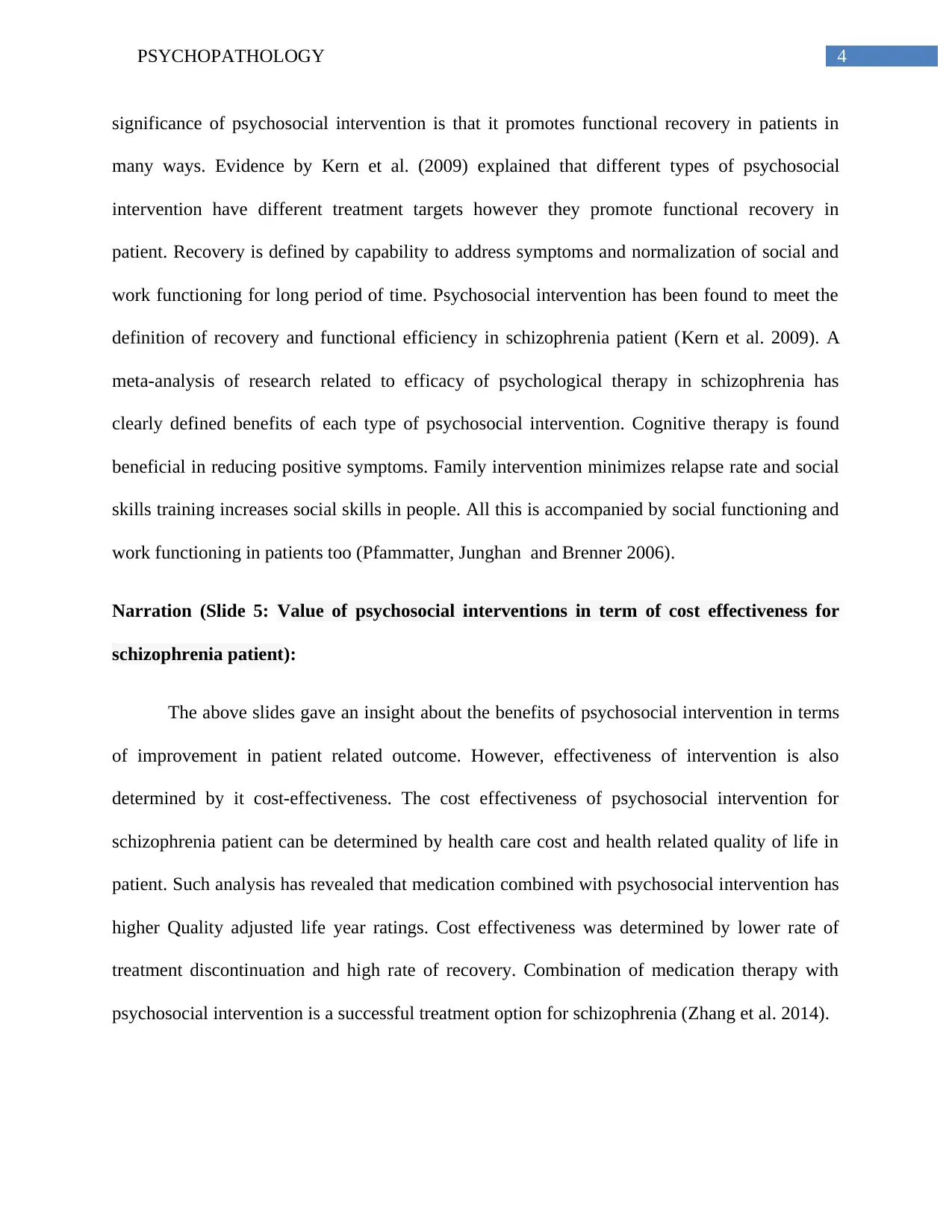
4PSYCHOPATHOLOGY
significance of psychosocial intervention is that it promotes functional recovery in patients in
many ways. Evidence by Kern et al. (2009) explained that different types of psychosocial
intervention have different treatment targets however they promote functional recovery in
patient. Recovery is defined by capability to address symptoms and normalization of social and
work functioning for long period of time. Psychosocial intervention has been found to meet the
definition of recovery and functional efficiency in schizophrenia patient (Kern et al. 2009). A
meta-analysis of research related to efficacy of psychological therapy in schizophrenia has
clearly defined benefits of each type of psychosocial intervention. Cognitive therapy is found
beneficial in reducing positive symptoms. Family intervention minimizes relapse rate and social
skills training increases social skills in people. All this is accompanied by social functioning and
work functioning in patients too (Pfammatter, Junghan and Brenner 2006).
Narration (Slide 5: Value of psychosocial interventions in term of cost effectiveness for
schizophrenia patient):
The above slides gave an insight about the benefits of psychosocial intervention in terms
of improvement in patient related outcome. However, effectiveness of intervention is also
determined by it cost-effectiveness. The cost effectiveness of psychosocial intervention for
schizophrenia patient can be determined by health care cost and health related quality of life in
patient. Such analysis has revealed that medication combined with psychosocial intervention has
higher Quality adjusted life year ratings. Cost effectiveness was determined by lower rate of
treatment discontinuation and high rate of recovery. Combination of medication therapy with
psychosocial intervention is a successful treatment option for schizophrenia (Zhang et al. 2014).
significance of psychosocial intervention is that it promotes functional recovery in patients in
many ways. Evidence by Kern et al. (2009) explained that different types of psychosocial
intervention have different treatment targets however they promote functional recovery in
patient. Recovery is defined by capability to address symptoms and normalization of social and
work functioning for long period of time. Psychosocial intervention has been found to meet the
definition of recovery and functional efficiency in schizophrenia patient (Kern et al. 2009). A
meta-analysis of research related to efficacy of psychological therapy in schizophrenia has
clearly defined benefits of each type of psychosocial intervention. Cognitive therapy is found
beneficial in reducing positive symptoms. Family intervention minimizes relapse rate and social
skills training increases social skills in people. All this is accompanied by social functioning and
work functioning in patients too (Pfammatter, Junghan and Brenner 2006).
Narration (Slide 5: Value of psychosocial interventions in term of cost effectiveness for
schizophrenia patient):
The above slides gave an insight about the benefits of psychosocial intervention in terms
of improvement in patient related outcome. However, effectiveness of intervention is also
determined by it cost-effectiveness. The cost effectiveness of psychosocial intervention for
schizophrenia patient can be determined by health care cost and health related quality of life in
patient. Such analysis has revealed that medication combined with psychosocial intervention has
higher Quality adjusted life year ratings. Cost effectiveness was determined by lower rate of
treatment discontinuation and high rate of recovery. Combination of medication therapy with
psychosocial intervention is a successful treatment option for schizophrenia (Zhang et al. 2014).
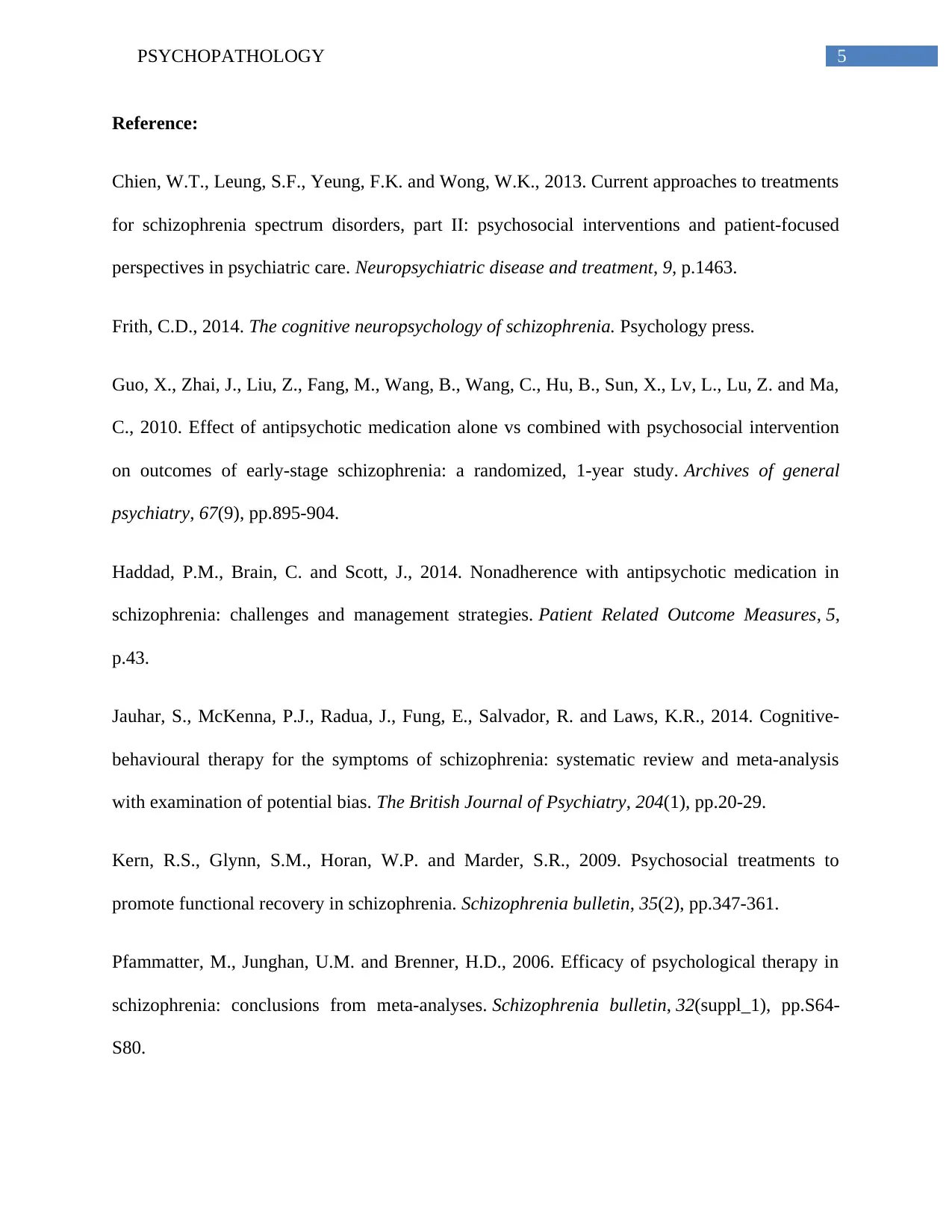
5PSYCHOPATHOLOGY
Reference:
Chien, W.T., Leung, S.F., Yeung, F.K. and Wong, W.K., 2013. Current approaches to treatments
for schizophrenia spectrum disorders, part II: psychosocial interventions and patient-focused
perspectives in psychiatric care. Neuropsychiatric disease and treatment, 9, p.1463.
Frith, C.D., 2014. The cognitive neuropsychology of schizophrenia. Psychology press.
Guo, X., Zhai, J., Liu, Z., Fang, M., Wang, B., Wang, C., Hu, B., Sun, X., Lv, L., Lu, Z. and Ma,
C., 2010. Effect of antipsychotic medication alone vs combined with psychosocial intervention
on outcomes of early-stage schizophrenia: a randomized, 1-year study. Archives of general
psychiatry, 67(9), pp.895-904.
Haddad, P.M., Brain, C. and Scott, J., 2014. Nonadherence with antipsychotic medication in
schizophrenia: challenges and management strategies. Patient Related Outcome Measures, 5,
p.43.
Jauhar, S., McKenna, P.J., Radua, J., Fung, E., Salvador, R. and Laws, K.R., 2014. Cognitive-
behavioural therapy for the symptoms of schizophrenia: systematic review and meta-analysis
with examination of potential bias. The British Journal of Psychiatry, 204(1), pp.20-29.
Kern, R.S., Glynn, S.M., Horan, W.P. and Marder, S.R., 2009. Psychosocial treatments to
promote functional recovery in schizophrenia. Schizophrenia bulletin, 35(2), pp.347-361.
Pfammatter, M., Junghan, U.M. and Brenner, H.D., 2006. Efficacy of psychological therapy in
schizophrenia: conclusions from meta-analyses. Schizophrenia bulletin, 32(suppl_1), pp.S64-
S80.
Reference:
Chien, W.T., Leung, S.F., Yeung, F.K. and Wong, W.K., 2013. Current approaches to treatments
for schizophrenia spectrum disorders, part II: psychosocial interventions and patient-focused
perspectives in psychiatric care. Neuropsychiatric disease and treatment, 9, p.1463.
Frith, C.D., 2014. The cognitive neuropsychology of schizophrenia. Psychology press.
Guo, X., Zhai, J., Liu, Z., Fang, M., Wang, B., Wang, C., Hu, B., Sun, X., Lv, L., Lu, Z. and Ma,
C., 2010. Effect of antipsychotic medication alone vs combined with psychosocial intervention
on outcomes of early-stage schizophrenia: a randomized, 1-year study. Archives of general
psychiatry, 67(9), pp.895-904.
Haddad, P.M., Brain, C. and Scott, J., 2014. Nonadherence with antipsychotic medication in
schizophrenia: challenges and management strategies. Patient Related Outcome Measures, 5,
p.43.
Jauhar, S., McKenna, P.J., Radua, J., Fung, E., Salvador, R. and Laws, K.R., 2014. Cognitive-
behavioural therapy for the symptoms of schizophrenia: systematic review and meta-analysis
with examination of potential bias. The British Journal of Psychiatry, 204(1), pp.20-29.
Kern, R.S., Glynn, S.M., Horan, W.P. and Marder, S.R., 2009. Psychosocial treatments to
promote functional recovery in schizophrenia. Schizophrenia bulletin, 35(2), pp.347-361.
Pfammatter, M., Junghan, U.M. and Brenner, H.D., 2006. Efficacy of psychological therapy in
schizophrenia: conclusions from meta-analyses. Schizophrenia bulletin, 32(suppl_1), pp.S64-
S80.
⊘ This is a preview!⊘
Do you want full access?
Subscribe today to unlock all pages.

Trusted by 1+ million students worldwide
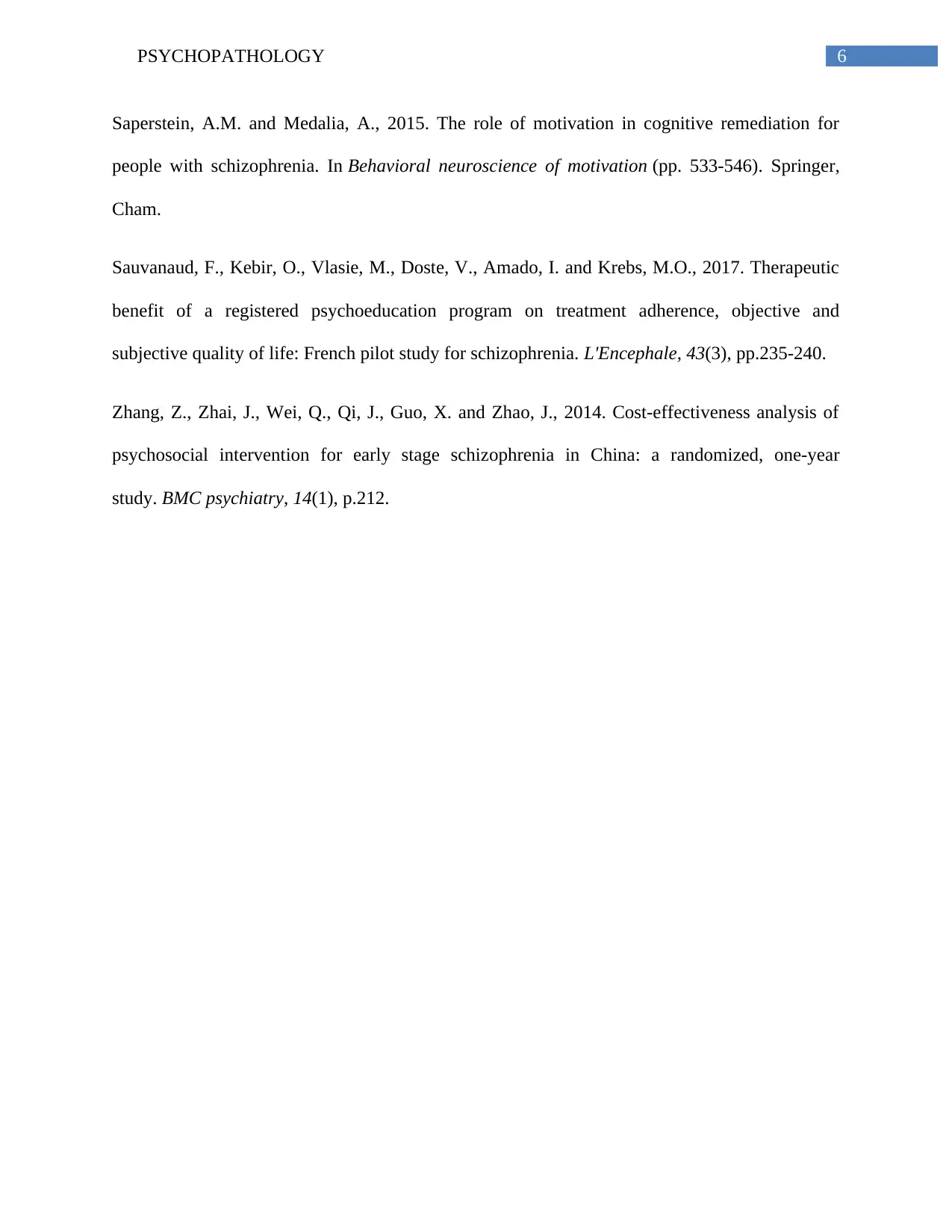
6PSYCHOPATHOLOGY
Saperstein, A.M. and Medalia, A., 2015. The role of motivation in cognitive remediation for
people with schizophrenia. In Behavioral neuroscience of motivation (pp. 533-546). Springer,
Cham.
Sauvanaud, F., Kebir, O., Vlasie, M., Doste, V., Amado, I. and Krebs, M.O., 2017. Therapeutic
benefit of a registered psychoeducation program on treatment adherence, objective and
subjective quality of life: French pilot study for schizophrenia. L'Encephale, 43(3), pp.235-240.
Zhang, Z., Zhai, J., Wei, Q., Qi, J., Guo, X. and Zhao, J., 2014. Cost-effectiveness analysis of
psychosocial intervention for early stage schizophrenia in China: a randomized, one-year
study. BMC psychiatry, 14(1), p.212.
Saperstein, A.M. and Medalia, A., 2015. The role of motivation in cognitive remediation for
people with schizophrenia. In Behavioral neuroscience of motivation (pp. 533-546). Springer,
Cham.
Sauvanaud, F., Kebir, O., Vlasie, M., Doste, V., Amado, I. and Krebs, M.O., 2017. Therapeutic
benefit of a registered psychoeducation program on treatment adherence, objective and
subjective quality of life: French pilot study for schizophrenia. L'Encephale, 43(3), pp.235-240.
Zhang, Z., Zhai, J., Wei, Q., Qi, J., Guo, X. and Zhao, J., 2014. Cost-effectiveness analysis of
psychosocial intervention for early stage schizophrenia in China: a randomized, one-year
study. BMC psychiatry, 14(1), p.212.
1 out of 7
Related Documents
Your All-in-One AI-Powered Toolkit for Academic Success.
+13062052269
info@desklib.com
Available 24*7 on WhatsApp / Email
![[object Object]](/_next/static/media/star-bottom.7253800d.svg)
Unlock your academic potential
Copyright © 2020–2026 A2Z Services. All Rights Reserved. Developed and managed by ZUCOL.





